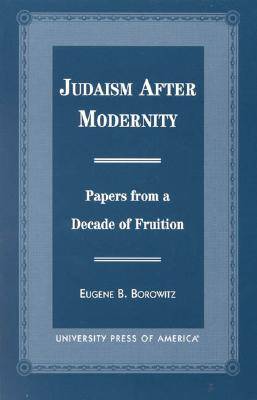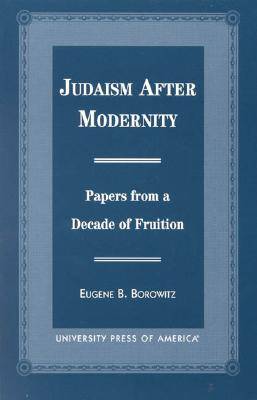
Door een staking bij bpost kan je online bestelling op dit moment iets langer onderweg zijn dan voorzien. Dringend iets nodig? Onze winkels ontvangen jou met open armen!
- Afhalen na 1 uur in een winkel met voorraad
- Gratis thuislevering in België vanaf € 30
- Ruim aanbod met 7 miljoen producten
Door een staking bij bpost kan je online bestelling op dit moment iets langer onderweg zijn dan voorzien. Dringend iets nodig? Onze winkels ontvangen jou met open armen!
- Afhalen na 1 uur in een winkel met voorraad
- Gratis thuislevering in België vanaf € 30
- Ruim aanbod met 7 miljoen producten
Zoeken
€ 124,45
+ 248 punten
Omschrijving
Judaism After Modernity presents a collection of writings by America's leading liberal Jewish theologian, who relates his activity as a prominent thinker in modern Judaism. Eugene B. Borowitz provides insights into his spiritual life and development as a prelude to his discussion of personal faith. His papers illustrate and reflect upon the intellectual religious path that led to the development of his postmodern Jewish theology expressed in his systemic statement of 1991, Renewing the Covenant. His writings reveal how he arrived at his unique position and describe how making this statement instigated the further development of his position. Borowitz then discusses the typical Jewish interest in praxis, what one is to do, rather than in doxis, what one says about one's beliefs, incorporating such issues as aging and Zionism. Finally, he presents his relations with his teacher Abraham J. Heschel, and deals with various interfaith issues through his relations with Arnold J. Wolf (a Jewish peer), John Hick, Frans Josef van Beeck, and Masao Abe (three famous non-Jewish teachers).
Specificaties
Betrokkenen
- Auteur(s):
- Uitgeverij:
Inhoud
- Aantal bladzijden:
- 428
- Taal:
- Engels
Eigenschappen
- Productcode (EAN):
- 9780761813293
- Verschijningsdatum:
- 18/03/1999
- Uitvoering:
- Hardcover
- Formaat:
- Genaaid
- Afmetingen:
- 160 mm x 237 mm
- Gewicht:
- 730 g

Alleen bij Standaard Boekhandel
+ 248 punten op je klantenkaart van Standaard Boekhandel
Beoordelingen
We publiceren alleen reviews die voldoen aan de voorwaarden voor reviews. Bekijk onze voorwaarden voor reviews.











